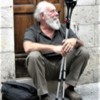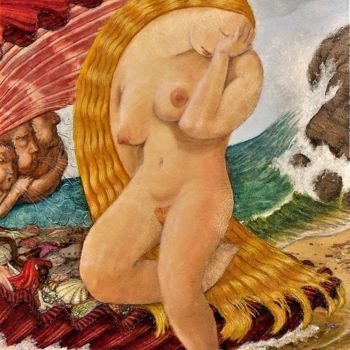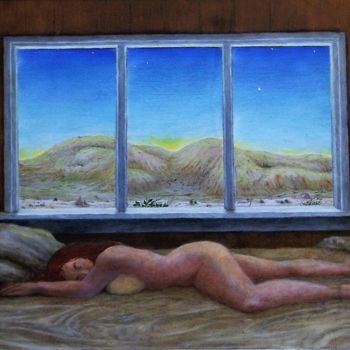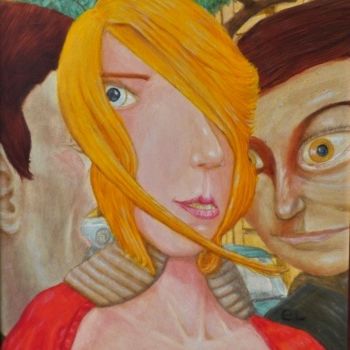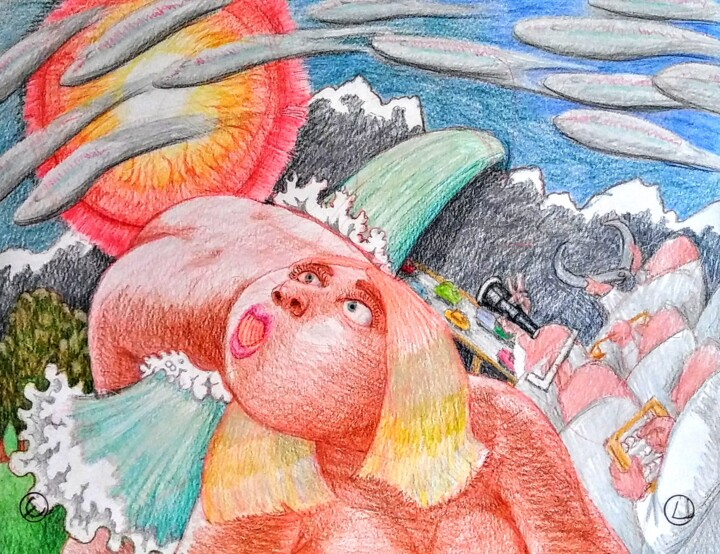


¡Háganos saber si le gustaría ver más fotos de esta obra de arte!
- Detrás del trabajo / lado del trabajo
- Detalles / Firma / Superficie o textura de la obra de arte
- Obra de arte en situación, Otro...
Scientists Study the Weather (2022) Dibujo por Edwin Loftus
Más información
- embalaje (Sobre) Todas las obras se envían cuidadosamente protegidas y aseguradas, con un transportista premium.
- Seguimiento Seguimiento del pedido hasta la entrega al comprador. Se proporcionará un número de seguimiento para que pueda seguir el paquete en tiempo real.
- Plazos de tiempo Entrega mundial de 3 a 7 días (Estimar)
Más información
- Certificado de autenticidad online rastreable Los certificados de autenticidad se pueden verificar en línea en cualquier momento escaneando el código de la obra de arte.
- Certificación de la cotización de artista. Los expertos estudian el conjuto de la obra de un artista y su carrera y luego establecen una cotización media independiente y fiable. La cotización media permite situar al artista en una gama de precios durante un período determinado. También se puede solicitar a los expertos que fijen una cotizacion para una obra en particular.
Más información
Pago seguro 100% con certificado SSL + 3D Secure.
Más información
Esta impresión está disponible en varios tamaños.
Vendido por Edwin Loftus
Esta imagen está disponible para descargar con una licencia
Vendido por Edwin Loftus
-
Obra de arte original (One Of A Kind)
Dibujo,
Pastel
en Cartulina
- Dimensiones Altura 11in, Anchura 14in
- Estado de la obra de arte La obra de arte está en perfectas condiciones
- Enmarcado Esta obra de arte no está enmarcada.
- Categorías Dibujos menos de 5.000 US$ Simbolismo Ciencia
To provide some context for understanding this:
- "Scientific method" is a collection of procedures by which we attempt to diminish distortions of perception caused by the subjective nature of perception. We attempt to impose objectivity on our subjectivity.
- Objectivity is purely aspirational, because, as Emmanuel Kant and others have argued, all perception is perception of the self. Therefore, all we assume to know about reality is actually just the perception of ourselves hypothetically responding to an existence beyond our ability to perceive.
- Science is based on the theory that there is an "objective" existence, independent of our subjective perceptions. Kant called these, "phenomena" and "noumena". For "science" to have value, there must be a noumena that is the source of the phenomena science studies.
This is significant because there is a competing theory also derived from Kant's (and other's) theories. It is, (in highly simplified form), that what is of value in the noumena, (objective reality), is not what it may have been, but what it is perceived as being. In this view, perception shapes reality in that reality is only known through perception. Whatever reality may be, what matters is what it is perceived as being. The implication of this being that what is real matters less than what is perceived as real.
This position recognizes that one can't simply declare something like gravity is not real and suddenly it will cease to be a factor. But perception actually lines up with a range of possibilities. Somewhere between this and that is what really is. We can't know what it is, but we can recognize that we don't know and think of it as this range of possibilities.
Or ... we can select somewhere in that range and push this assumption. Insofar as that potential is perceived as the most likely or most useful potential, it becomes "reality-insofar-as it is perceived."
This is how "science" becomes a tool of politics instead of a tool for the exploration of reality. If enough people can be convinced that "science" says reality is 'this' and not ' 'that' it qualifies those that see reality as 'this' and not 'that' as "more realistic" in their views and this gives the advocates and beneficiaries of 'this' an advantage over the advocates and beneficiaries of 'that'. And that advantage can translate into social power leading to reality as we experience being dominated by their views rather than those other's views.
Of course, "science" (or the appearance of science) has not been the only way assumptions about the nature of reality have been judged. "Science" as a discipline we teach and develop, is only about 500 years old. Prior to that, systems like "Holy Word", "Learned Opinion", "Established Wisdom", and "Personal Experience" were how one possibility was given significance over another possibility. Those earlier systems are still challenging science and "science" as alternatives today and have become targets of "science" or "pseudoscience" because they interfere with various people's ability to control what is predominantly accepted as possible.
In this image I used "Anthropogenic Global Warming" (changed to "Man-made Climate Change") as an example of this sort of effort. While scientific method has been used to produce some of the evidence used to support this theory, the theory is not a product of anything that could be called scientific method. I have portrayed this with a group of lab-coated men holding various measuring devices to try to study a subject, (Earth's Atmosphere) that is still very far beyond their ability to comprehend, and therefore to predict.
So, this is an image, not about the atmosphere or science, but about the latest of a series of efforts to support one idea about the best organization of societies over another idea.
The foundational issue from which these other issues arise is - Are average human beings of adult age best suited to manage their own lives and social interactions, are they better served by having more capable or better prepared people manage significant elements of their lives for them, or is there, and what is, the best compromise between these?
Temas relacionados
Edwin Loftus es un pintor y dibujante estadounidense nacido en 1951. Su interés por el arte comenzó a los 4 años cuando decidió dibujar algo real en lugar de trabajar desde su imaginación.
De niño destacó en el dibujo y de adolescente comenzó a experimentar con la pintura al óleo. En la universidad, tomó cursos de arte e historia del arte y se dio cuenta de que el verdadero arte no tenía nada que ver con la calidad del dibujo o la pintura, sino que tenía que tener la ambición de traspasar los límites y ampliar la experiencia visual.
También estudió filosofía, psicología e historia y rápidamente se dio cuenta de que era solo otro establecimiento de arte que intentaba defender su industria elitista y su sistema de recompensas. Sus habilidades eran casi inexistentes, no sabían nada sobre psicología, percepción o respuesta a estímulos, y eran extensiones del sistema de creencias que hicieron del comunismo, el fascismo y otras formas de totalitarismo fuerzas tan destructivas en el mundo. Literalmente creen que el arte no debería estar disponible para los seres humanos comunes, sino solo para una élite lo suficientemente "sofisticada" para entenderlo.
Edwin Loftus se dio cuenta de que los emperadores del arte no tenían ropa, pero seguían siendo los emperadores. Dotado en el arte, trabajó duro para adquirir esta habilidad. Así que encontró otras formas de ganarse la vida y vendió algunas obras de arte de vez en cuando. Durante sesenta años, muchas personas disfrutaron de sus obras y algunas las coleccionaron.
Hoy, Edwin Loftus está jubilado. Incluso si vendiera todas sus pinturas por el precio que pidió, "artista" sería el trabajo peor pagado que jamás haya tenido... pero así son las cosas. No le importará después de que muera. Solo espera que a algunas personas les guste lo que hace lo suficiente como para disfrutarlo en el futuro.
-
Nacionalidad:
ESTADOS UNIDOS

- Fecha de nacimiento : 1951
- Dominios artísticos: Obras de artistas con valor de artista certificado,
- Grupos: Artistas certificados Artistas Americanos Contemporáneos



